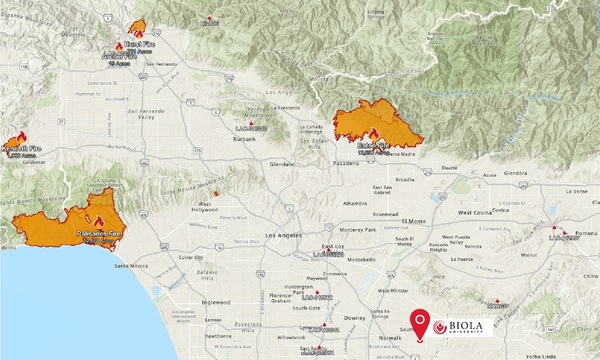Biola University has been granted a 10-year reaccreditation term, the longest term possible, from the Western Association of Schools and Colleges (WASC) Senior College and University Commission (WSCUC).
“We are extremely grateful and humbled by the affirmation Biola received by WSCUC, especially during a time when Biola’s mission is being questioned and threatened by the state legislature,” said President Barry H. Corey.
The announcement comes after the Commission evaluated Biola’s institutional report and conducted a three-day on-site review in April. Over the last year Biola has been under the reaffirmation of accreditation review by WSCUC. The new accreditation term will last until 2025 at which point Biola will undergo another review process.
“We appreciate all the work that was done during the review process,” said Deborah Taylor, provost and senior vice president. “Receiving the longest possible term of ten years is encouraging and indicative of Biola’s strong commitment to high quality standards in higher education.”
The commission was impressed with the last four years of diligent work that took place at Biola. As stated in the official letter from the commission, they “appreciate the extensive work that Biola University undertook in preparing for and supporting this accreditation review.”
The Commission praised Biola for its commitment to ethnic and cultural diversity across the institution, specifically with the establishment of the Mosaic Cultural Center. They also commended seven other areas including leadership’s commitment to thinking proactively about future challenges and trends.
Commendations
The Commission commends Biola University in eight areas:
-
The focused commitment of the trustees and the president to Biola’s missional integrity and for taking affirmative steps to think proactively about future challenges and trends in higher education, in general, and for Biola, specifically.
-
Enthusiastically, and in transparent manner, engaging in institutional review and comparison of the institution’s policies, procedures, and practices with preferred practices evident among WSCUC institutions and described in the Criteria for Review.
-
The provost and her leadership in creating an institutional culture that engages in data-informed planning and decision-making, supported by a robust institutional research and information technology team.
-
Efforts to foster and support ethnic and cultural diversity across the institution and at the board level. The Mosaic Cultural Center serves as a fitting exemplar of the institution’s commitment to this value.
-
The administration and faculty and their development of the Authority, Responsibility, and Communication Project (ARC) as it relates to the various committees and offices throughout the institution.
-
Biola’s administrative team and its careful stewardship of the institution’s fiscal and physical resources.
-
The institution’s leadership team for development of the Academic and Administrative Prioritization Process (AAP) to preserve the institution’s relevance and health in view of the rapidly changing needs of its students and society.
-
The faculty and academic administration’s sustained progress in implementing assessment processes in order to improve student learning, personal development, and success.
Recommendations
The Commission also recommended the university continue work in the following five areas.
-
Fully utilize the collective talents and commitments of trustees, administrators, and faculty members to strengthen the effectiveness of the institution in operationalizing its mission through a published and implemented shared governance model based on best practices in higher education and in harmony with the Criteria for Review.
-
While most employ high quality assessment processes, ensure the creation and full implementation of assessment processes for all of Biola University’s academic programs.
-
Seek multiple ways to take advantage of ethnic, cultural, and socio-economic diversity to enhance the depth and breadth of ideas considered in classroom interactions.
-
Through faculty and staff collaboration, address the concerns expressed by the significant number of students who do not feel adequately prepared for employment in their chosen vocations.
-
Sustain university leaders’ support of the vital univeristy projects identified as the Academic and Administrative Prioritization Process (AAP) and the Authority, Responsibility and Communication Project (ARC) in order to strengthen the institution’s reliance on transparent and inclusive approaches to decision making and policy development.
“We will continue to work together as a community to strengthen the areas of further development to make Biola a better place of learning for our students,” said Corey.
Read the full WASC Senior College and University Commission report and the action letter from the Commission.
 Biola University
Biola University
.jpeg)
.jpg)
_(1).jpg)